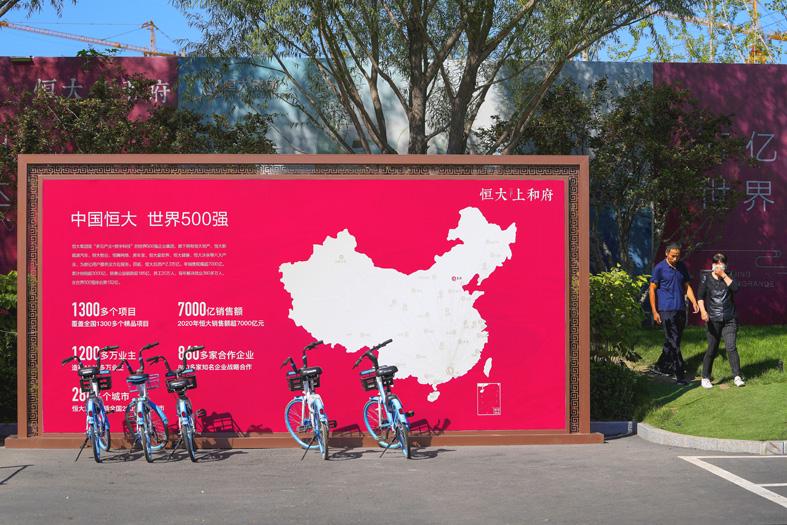China Evergrande Group (恆大集團), which is struggling under US$310 billion in debt, on Friday said that it might run out of money to “perform its financial obligations” sending Chinese regulators scrambling to reassure investors that China’s financial markets can be protected from a potential fallout.
Evergrande’s struggle to comply with official pressure to reduce debt has fueled anxiety that a possible default might trigger a financial crisis.
Economists say that global markets are unlikely to be affected, but banks and bondholders might suffer because Beijing wants to avoid a bailout.

Photo: AP
After reviewing Evergrande’s finances, “there is no guarantee that the group will have sufficient funds to continue to perform its financial obligations,” the company said in a Hong Kong Stock Exchange filing.
Shortly after the statement, regulators tried to soothe investor fears by issuing statements saying that China’s financial system was strong and that default rates are low.
They said that most developers are financially healthy and that Beijing would keep lending markets functioning.
“The spillover impact of the group’s risk events on the stable operation of the capital market is controllable,” the China Securities Regulatory Commission said on its Web site.
The Chinese central bank and bank regulator issued similar statements.
Evergrande — the global real-estate industry’s biggest debtor — owes 2 trillion yuan (US$313.7 billion), mostly to domestic banks and bond investors. It also owes US$19 billion to foreign bondholders.
The company, which has 2.3 trillion yuan in assets, has struggled to turn that into cash to pay bondholders and other creditors. It called off the US$2.6 billion sale of a stake in a subsidiary in October last year, because the buyer failed to follow through on its purchase.
Evergrande on Friday said it faces a demand to fulfill a US$260 million obligation.
If that obligation cannot be met, other creditors might demand repayment of debts earlier than normal, it added.
The company has missed deadlines to pay interest on some bonds, but made payments before a grace period ended and was declared in default.
Evergrande also said that some bondholders can choose to be paid by receiving apartments that are under construction.
Evergrande chairman Xu Jiayin (許家印) was on Friday summoned to meet with officials of Guangdong Province, a Chinese government statement said.
The statement said a government team would be tasked to help Evergrande oversee risk management.
Evergrande’s struggle has prompted warnings that a financial squeeze on real estate — an industry that propelled China’s explosive economic boom from 1998 to 2008 — could lead to trouble for banks, and an abrupt and politically dangerous collapse in growth.
The slowdown in construction helped depress China’s economic growth to an unexpectedly low 4.9 percent year-on-year in the three months ending in September.
Forecasters expect growth to decelerate further if financing curbs stay in place.

South Korea’s equity benchmark yesterday crossed a new milestone just a month after surpassing the once-unthinkable 5,000 mark as surging global memory demand powers the country’s biggest chipmakers. The KOSPI advanced as much as 2.6 percent to a record 6,123, with Samsung Electronics Co and SK Hynix Inc each gaining more than 2 percent. With the benchmark now up 45 percent this year, South Korea’s stock market capitalization has also moved past France’s, following last month’s overtaking of Germany’s. Long overlooked by foreign funds, despite being undervalued, South Korean stocks have now emerged as clear winners in the global market. The so-called “artificial intelligence

Chinese artificial intelligence (AI) start-up DeepSeek’s (深度求索) latest AI model, set to be released as soon as next week, was trained on Nvidia Corp’s most advanced AI chip, the Blackwell, a senior official of US President Donald Trump’s administration said on Monday, in what could represent a violation of US export controls. The US believes DeepSeek will remove the technical indicators that might reveal its use of American AI chips, the official said, adding that the Blackwells are likely clustered at its data center in Inner Mongolia, an autonomous region of China. The person declined to say how the US government received

‘SEISMIC SHIFT’: The researcher forecast there would be about 1.1 billion mobile shipments this year, down from 1.26 billion the prior year and erasing years of gains The global smartphone market is expected to contract 12.9 percent this year due to the unprecedented memorychip shortage, marking “a crisis like no other,” researcher International Data Corp (IDC) said. The new forecast, a dramatic revision down from earlier estimates, gives the latest accounting of the ongoing memory crunch that is affecting every corner of the electronics industry. The demand for advanced memory to power artificial intelligence (AI) tasks has drained global supply until well into next year and jeopardizes the business model of many smartphone makers. IDC forecast about 1.1 billion mobile shipments this year, down from 1.26 billion the prior

FORTUNES REVERSED: The new 15 percent levies left countries with a 10 percent tariff worse off and stripped away the advantage of those with a 15 percent rate In a swift reversal of fortunes, countries that had been hardest hit by US President Donald Trump’s tariffs have emerged as the biggest winners from the US Supreme Court’s decision to strike down his emergency levies. China, India and Brazil are among those now seeing lower tariff rates for shipments to the US after the court ruled Trump’s use of the International Emergency Economic Powers Act to impose duties was illegal. While Trump subsequently announced plans for a 15 percent global rate, Bloomberg Economics said that would mean an average effective tariff rate of about 12 percent — the lowest since